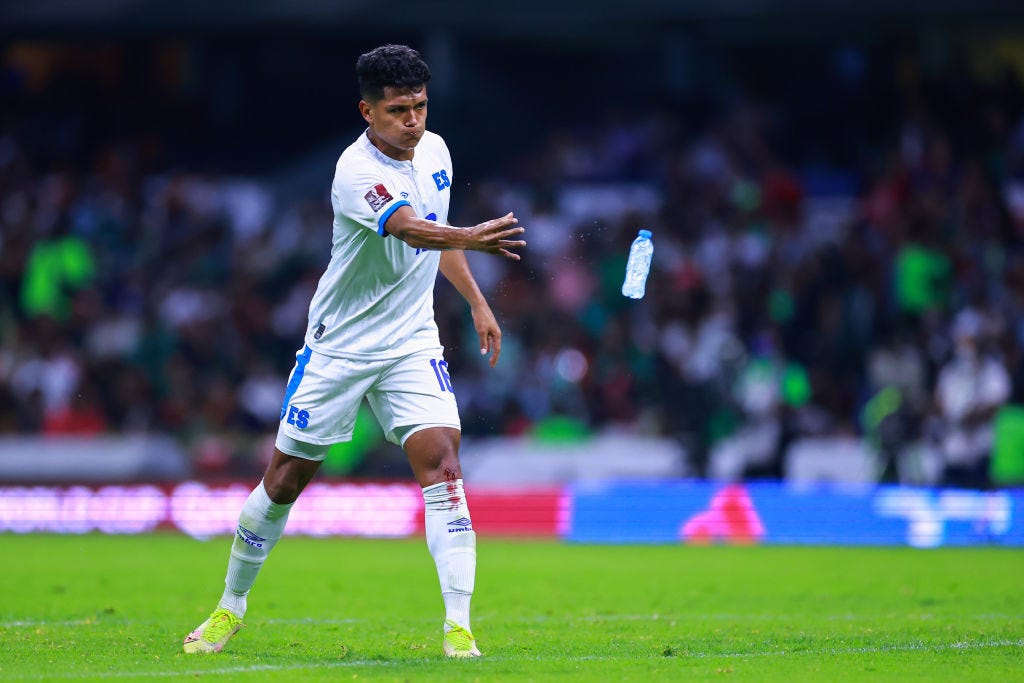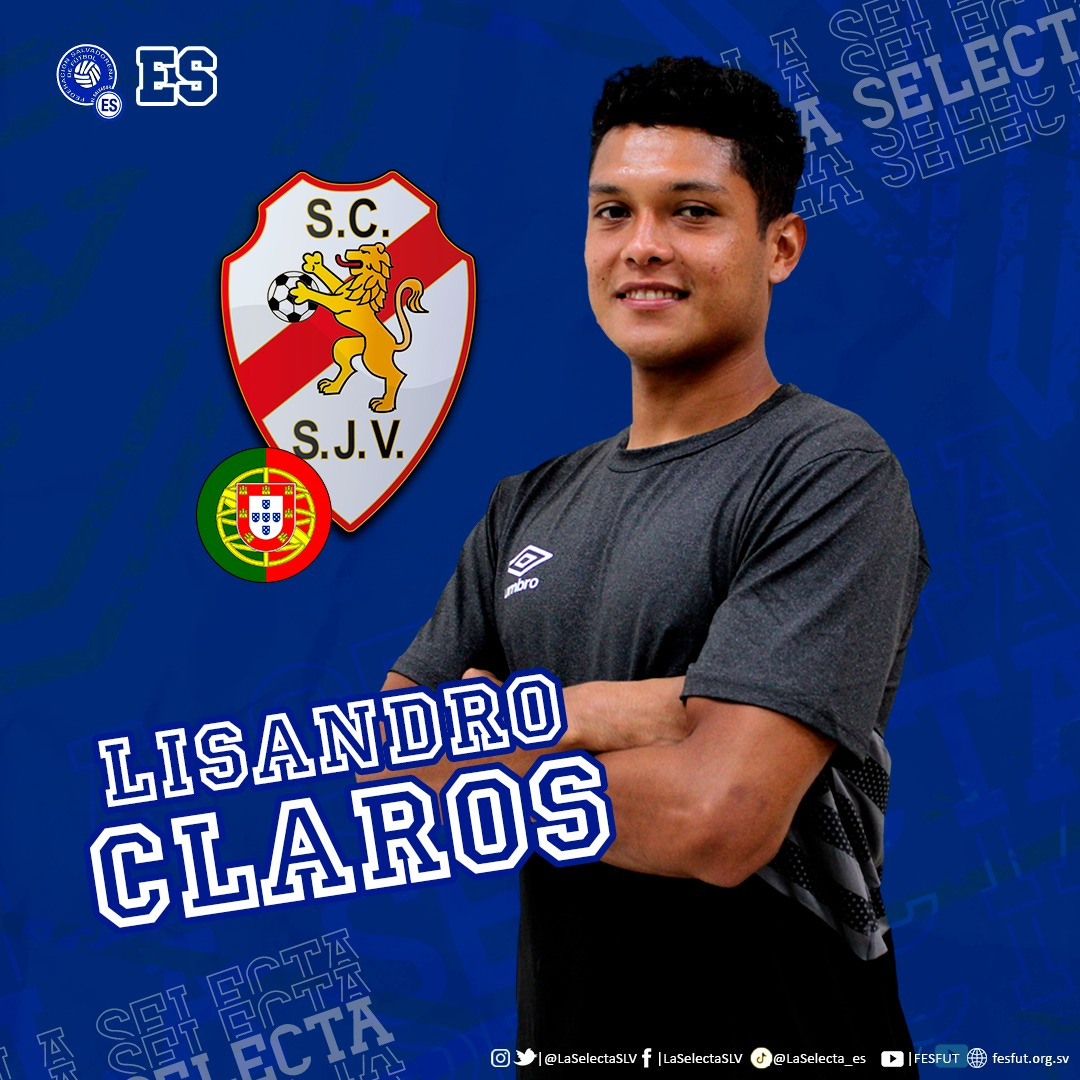🇸🇻 Lizandro Claros bets on himself with Portugal move
After being deported from the U.S. & deciding to give up on soccer, the El Salvador international may be closer than ever to a breakthrough.
Lizandro Claros knows he’s taking a risk. He knows his decision to leave Águila, in El Salvador’s first division, for SC São João de Ver of Portugal’s third division isn’t the decision most people would make.
It’s a bet on himself, on his future, taking less money now in hopes of making lots more later. But bets don’t always pay out, especially when the house is as powerful as it is. Claros knows that too, though. And he knows that sometimes, even when it looks like a risk hasn’t paid off, it still was a risk worth taking.
“Look, I’ve always been open to any opportunity that comes my way,” Claros tells me this week from Portugal. “Since I was young, I’ve been Catholic and have always felt anything that happens in my life that God has the right things at the right time.”
That’s why he says he has no hate in his heart for the United States, the country that deported him and his brother a decade after a 10-year-old Lizandro presented false documents to board a flight and meet up with a mother he hardly remembered and a father he’d last seen when he was one.
That’s why, when he had given up on soccer and decided to get his degree from a university in Nicaragua, he felt a tug to play for free with a team in the country’s second division and found his passion for the sport reignited.
And it’s why this summer he left his family, his girlfriend and his friends in El Salvador to move to a small town in Portugal where he hopes he impresses a scout for a team like Benfica, Porto or Sporting Lisbon.
“Coming to a third division from a first division isn’t really something that’s seen, for a lot of reasons, but when I started to ask around about Portugal, a lot of people told me Portugal is really well-scouted and it’s normal for a first—division team to bring players up from the third or fourth division,” Claros said. “I think in soccer everything requires a sacrifice, and I’ve always had that in my mind since I started my career in soccer. For me, it’s more about the opportunity.
“Maybe it doesn’t happen in Portugal, but just by coming here to Portugal other doors can open that never would’ve opened in El Salvador.”
Doors opened in El Salvador he never thought would open to him, either. That 10-year-old on the plane linked up with his family and became a promising youth player as he went to school in the United States. He and his older brother, Diego, were given temporary reprieves from deportation and generally lived the life of typical American teenagers. Treatment by the United States Immigration and Customs Enforcement changed as the two boys transitioned into adulthood.
Claros earned a scholarship offer to a university in North Carolina, but with his brother working as a mechanic in Maryland, Claros remembers the agency saying they’d be too difficult to find were something to happen. A lawyer had suggested the brothers not show up to the check-in with ICE with the state change something that could rankle the agency, but the Claros brothers wanted to show they were taking the right steps in the U.S.
“We felt like we hadn’t done anything wrong and that they’d like the idea of studying thanks to the scholarship, which is the American dream for a lot of people,” he said. “We showed up and they said we couldn’t leave.”

After a weekend in county jail, they flew commercial to El Salvador. Claros decided his professional soccer dreams were over and headed to the school in Nicaragua.
“To be honest with you, I never thought I’d be making a living from football or that I’d become a professional,” he said. “When I was deported from the United States, I went to trail at Águila. Talking with the guys who were in the reserves there, what they were earning was almost nothing, so from there I made the choice to go study instead of following my dreams with soccer.”
In Nicaragua, he got linked up with a team and then went on more trials over the summer in El Salvador, catching on with Independiente of San Vicente. After preseason, Claros felt he’d ride the pine most of the tournament but found himself starting the season opener when one center back was suspended and another couldn’t be registered.
“I told my family, ‘Just being here warming up, sitting on the bench, I’m happy.’ I was the last option,” he said. “But I go in, we played, we won 1-0 and I had a really good game with the center-back I was with.”
That season was cut short by the pandemic but not before Claros started 11 matches and drew the eye of several people in the national team setup. After an offseason move to Firpo, Claros was on the radar of U-23 coach Hugo Perez. He earned a place on the U-23 team for March 2021’s Olympic qualification tournament.

From there, he moved onto Águila and regularly was called into microcycles, mini-camps with domestic-based players, by Perez, who took over the senior national team.
It’s not without irony that Claros has once again left Águila, this time working for less money than he would’ve earned with one of El Salvador’s biggest clubs.
But the 24-year-old feels like this summer’s move, which came about when a representative from the Portuguese club spotted him at the Olympic qualification tournament, is his best chance to get spotted by a top European team.
Even if it doesn’t work, Claros feels like he’s lived a dream come true. Debuting with La Selecta in October 2021, Claros heads to Portugal as a full-fledged senior international, with World Cup qualification appearances against Mexico and a cameo in June’s Nations League draw with the United States.
“What can I say? Playing against the national teams I’ve played against - two games against Mexico, once in El Salvador and the other in the Azteca, which I never imagined - and then against the United States playing a couple minutes, honestly they’re dreams that have come true for me.”

Claros said he never thought he’d even see U.S. stars like Christian Pulisic or Weston McKennie up close, much less be tasked with shutting them down.
Playing in the U.S. still isn’t possible for Claros, meaning he’s unable to showcase his skills for Perez and his staff in friendly matches in the U.S. or take part in tournaments like the Gold Cup hosted in the country.
He says he’d love to “have that problem solved” at some point but is more eager to return to the U.S. to see his parents for the first time in five years rather than play a soccer match.
Despite that, he says he remains thankful for his time in the U.S. and the opportunity the country that deported him and set him off on his soccer journey afforded him and his family.
“I’ve never felt any anger toward the country, in fact I’d say I’m thankful because thanks to this country and obviously my parents I had a lot of opportunities and things many Salvadorans would want to have,” he said.
The circumstances are much different now as he once again leaves El Salvador, a grown man fully aware of the risk he’s taking and the opportunity he hopes to find.






now to find out how to stream the Portuguese 3rd division!